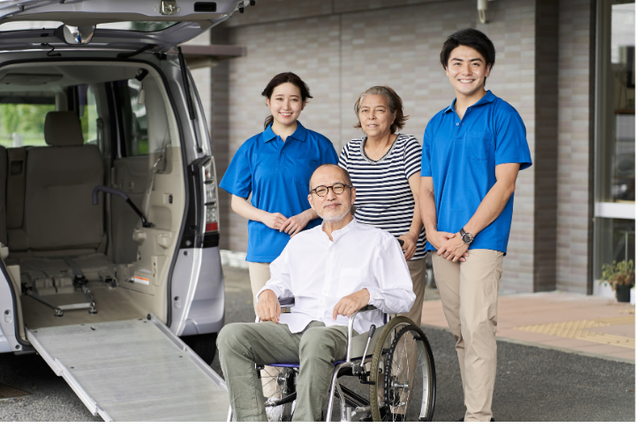Boost Access with Professional Medical Transportation Services Near Me
Boost Access with Professional Medical Transportation Services Near Me
Blog Article
Obtainable and Affordable Medical Transport Options for Seamless Wellness Support
In the realm of healthcare, the availability and affordability of clinical transport are paramount in ensuring people can access the care they need when they require it. The ability to flawlessly navigate transport choices can considerably influence a person's capacity to receive prompt medical interest, follow-up care, and total well-being. From non-emergency clinical transport services to cutting-edge solutions like telehealth, the landscape of clinical transport is developing to meet the varied demands of clients. Thinking about the value of this facet in medical care distribution, discovering the range of choices offered comes to be important for dealing with gaps in availability and price.
Non-Emergency Medical Transportation Services

These solutions are staffed by trained professionals who focus on person comfort and security throughout transit. Chauffeurs are outfitted to handle individuals with varying clinical demands and guarantee that all trips are smooth and stress-free - Medical Transportation Services Near Me. In addition, non-emergency clinical transport services usually utilize specific vehicles that are wheelchair-accessible, making them suitable for a vast array of individuals with various movement demands
Volunteer Vehicle Driver Programs
Volunteer motorist programs contribute in supplying transport assistance for individuals looking for non-urgent clinical treatment. These programs depend on the generosity of volunteers who donate their time and automobiles to assist transport patients to and from clinical visits. By using volunteer motorists, organizations can offer an economical service for individuals that might not have access to reputable transportation.
Among the crucial benefits of volunteer driver programs is the individualized care and interest that patients obtain. Unlike standard transportation solutions, volunteer vehicle drivers often establish a connection with the individuals they aid, developing a compassionate and encouraging atmosphere during what can be a stressful time. Additionally, volunteer driver programs can aid connect the space for individuals staying in underserved or rural areas where mass transit alternatives may be restricted.
Public Transportation Options

Among the crucial advantages of public transport is its widespread accessibility in country and urban areas alike. This considerable network enables clients from varied histories to travel to clinical consultations with relative simplicity. In addition, public transportation systems are frequently outfitted to accommodate individuals with handicaps, offering easily accessible travel see post choices for those with flexibility difficulties.

Ride-Sharing and Transportation Network Firms
The evolution of contemporary transport alternatives for medical functions expands past traditional public systems like buses and trains to include the cutting-edge realm of ride-sharing and transportation network companies. Ride-sharing services such as Uber and Lyft have actually reinvented the means people travel to medical visits, using ease and adaptability to people that may not have accessibility to their lorries or traditional public transport. These platforms enable users to request a ride with the touch of a switch on their smart devices, supplying door-to-door solution that can be especially advantageous for individuals with mobility obstacles or those calling for help.
Transport network business (TNCs) have actually also played a significant role in bridging the void in clinical transport services. Business like Veyo and RoundTrip focus on non-emergency medical transportation, dealing with people who need a greater degree helpful throughout their journeys to medical facilities. By partnering with health care suppliers and insurance firms, TNCs make sure that clients can access reputable and timely transportation options, ultimately adding to enhanced health and wellness results and client contentment.
Telehealth and Virtual Examinations
Enhancing medical care ease of access and ease, telehealth and online appointments have become pivotal parts in modern medical techniques, transforming the means patients engage with healthcare providers. Telehealth leverages innovation to facilitate remote communication in between patients and health care experts, supplying a broad selection of solutions such as virtual appointments, remote tracking, and digital prescriptions. Virtual appointments allow clients to seek medical recommendations, medical diagnosis, and therapy from the comfort of their homes, eliminating the requirement for physical sees to medical care centers. This strategy not only saves time and decreases transportation expenses for clients however additionally boosts the total efficiency of healthcare delivery.
In addition, telehealth plays a critical duty in expanding medical services to underserved neighborhoods, backwoods, and people with minimal flexibility. By damaging down geographical obstacles and boosting health care outreach, telehealth promotes early intervention, continuity of care, and patient involvement. As modern technology remains to breakthrough, telehealth is positioned to play a significantly significant role in forming the future of health care shipment, cultivating improved health results and patient satisfaction.
Final Thought

From non-emergency medical transport services to cutting-edge options like telehealth, the landscape of medical transport is developing her explanation to fulfill the diverse needs of individuals.Non-Emergency Medical Transportation Provider help with the secure and timely transport of people requiring non-urgent clinical care to and from healthcare centers.The evolution of modern transport options for clinical purposes prolongs past conventional public systems like trains and buses to include the cutting-edge realm of ride-sharing and transport network companies.Transport network business (TNCs) have actually also played a significant function in bridging the space in medical transport services. Non-Emergency Medical Transport Solutions, Volunteer Vehicle Driver Programs, Public Transportation Options, Ride-Sharing and Transport Network Firms, and Telehealth and Virtual Consultations all play a crucial function in addressing transport obstacles to health care accessibility.
Report this page